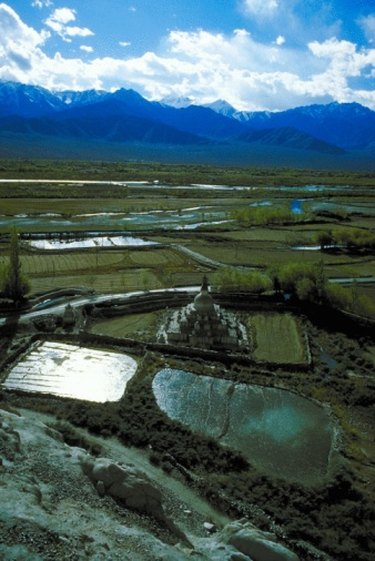
Biofertilizers are compounds of organic matter that are applied to crops for growth and health. Their constituent micro-organisms biologically interact with the soil, root and seed of plants, promoting the growth of micro-flora that enhances soil fertility. As chemical fertilizers cause a deterioration of the soil vitality over time, biofertilizers are attractive alternatives, benefiting harvests and soil alike.
Increasing Harvest Yields
Video of the Day
Whether a farm serves for subsistence or for commercial purposes, the farmer seeks a large and plentiful harvest. To this end, biofertilizers on average increase crop yields by 20 to 30 percent. Algae-based fertilizers have improved yields in rice at rates ranging between 10 and 45 percent. In fact, Egyptian scientists, experimenting with biofertilizers in navel orange groves, reported yield increases of over 12 percent and orange weight increases of near 50 percent. The scientific support for biofertilizers is growing.
Video of the Day
Fortifying the Soil
Biofertilizers provide beneficial support to the soil. Aquatic cyanobacteria, for example, bestows natural growth hormone, protein, vitamins and minerals to the sod. Azotobacter, particularly effective where legumes are planted, is known to infuse the earth with antibiotic pesticide. Natural fertilizers of this kind replenish the soil's fertile capacity. Moreover, they can strengthen the soil against drought and inhibit the spread of soil-borne diseases like pythium and phytophthora, which may follow in the wake of heavy rains.
Lowering Production Costs
To gain profit from the land, a farmer has to invest in it. Aside from hard work, the farmer must buy seed, maintain equipment, purchase fuel and acquire fertilizer, among other expenses. Fertilizer is a costly input item, exacting $127 per acre for the highest grade nitrogen. By contrast, spreading cow manure at the same rate would only cost $47. Yet manure may require purchasing a different applicator. Biofertilizers can be applied in the same manner as their chemical counterparts. A Philippine government case study recently demonstrated that a farmer can save 50 percent on input costs using biofertilizer.
Improving Sustainability
Although chemical fertilizers may have a temporary, salutary effect on a crop in terms of yield, they also have a long-term destructive effect on the environment supporting the crop. In addition to soil erosion, chemicals can pollute the watershed. This, in turn, will harm livestock, wildlife and public health. Biofertilizers leave no such legacy. In fact, the opposite is true: they strengthen the soil profile, leave water sources untainted and edify plant growth without detrimental side-effects.
- "Journal of American Science"; Microbial Bio-Fertilization Approaches to Improve Yield; Shamseldin et al; 6/21/2010
- "Western Farm Press"; Soil-Borne Diseases; 8/21/2006
- Phillipine Council for Agriculture, Forestry and natural Resources Research and Development; Biofertilizer Saves Malangas Farmer 50% in Production Cost; Y.T. Avellaneda; 2/24/2011
- "Science Daily"; Manure Provides Higher Returns Than Chemical Fertilizers, Economist Says; 6/29/2010
- USDA Agricultural Research Service
- National Sustainable Agriculture Coalition
- SustainableTable.org; The Issues; Soil